- Home
- Richard Matheson
Earthbound Page 10
Earthbound Read online
Page 10
“Why, is she ugly?” That was better, bland, aloof.
Mrs. Brentwood looked amused. “Ugly?” she repeated. “Hardly. She’s the most beautiful woman I’ve ever seen.”
“You’ve seen her then.” He tried to sound intrigued.
Her gaze read his with curious detachment “How else could I have known about her?” she asked.
“I gathered from what you said last night that you knew very little about the cottage.” David’s tone was openly challenging now.
Mrs. Brentwood smiled. “I know enough,” she said.
David tried to look disinterested.
“I see her as I walk,” she told him. “She watches me.
Something aberrant in her tone made David look more closely at her, sensing that he’d found a key. “From where?” he asked.
“The studio.”
He nodded. “And are you the only one who’s seen her?”
Mrs. Brentwood’s smile was one of cool detachment. “Mr. Cooper, I have lived for sixty-seven years,” she said. “I have yet to have my first hallucination.”
David tightened. “You have no doubts, then, that this—this—”
“Marianna” she supplied, her tone implying that she knew he was aware of the name.
“Yes,” he said. “You know that she’s a ghost.”
Her answer was another smile.
“All right” he said, concedingly. “I’ll be predictable and ask. How do you know?”
“For the very simple reason, Mr. Cooper, that she died some years ago.”
David was unable to prevent himself from shuddering.
“You look distressed,” she said.
“Well—” He managed a straining smile. “It isn’t every day that …” He wanted her to leave and yet he couldn’t let her go; he had to hear it all now. “Were you a witness to her death?” he asked.
“I saw her afterward,” she answered. David waited, staring at her. “Her corpse, that is,” she said.
He shivered violently.
“You have seen her, haven’t you?” Mrs. Brentwood said.
“What?” he frowned. “I told you—”
“I know what you’ve told me,” she cut him off. “I, also, know what I see.”
“See?” His effort to sound merely curious was unsuccessful.
“Your face,” she said. He stiffened as she put her hand on his arm. “Leave the house, Mr. Cooper,” she said.
“What do you mean about my face?”
She drew her hand away with a sigh. “Very well, then, we’ll assume that you have not seen Marianna,” she began.
“Mrs. Brentwood—!”
“All right; you haven’t seen her then.” She ran her gaze across his face. “Unfortunately, whether you have or not, you’ve been exposed to her. And suffered by her presence.”
Abruptly, he felt stripped of logic and defense. “Which means?” he asked.
“Which means that there is terrible depletion in your face,” she said. “The depletion which is brought about by psychic attack.”
David struggled back toward rationality. “I’m afraid that sounds absurd,” he said.
“You’re exhausted, aren’t you?” she told him. “You sleep too much. You have a dreadful thirst which cannot be relieved. Your solar plexus feels abused and tender. Please—don’t bother to deny it. I’m not here to argue, only to persuade you to quit this house.”
Mrs. Brentwood’s words had acted on him like a surgeon’s scalpel, slicing away the last of his assurance. That she knew these things appalled him. He still fought against accepting the idea of ghosts—a subject which had always evoked skeptical amusement in him—but he could no longer avoid a chilling infestation of fear.
“Will you go?” she asked. “There’s no need to tell your wife if that concerns you. Give her some other reason for leaving.”
Despite his unsettled state, David felt the lancing of a cruel amusement. Getting Ellen to leave was hardly the greatest of his problems right now.
“There’s a small inn several miles along the beach,” Mrs. Brentwood said. “Very charming, very clean. I know the manager; I’ll phone him if you like. I do suggest you go there though.” Her gaze probed sharply into his. “Immediately.”
David looked at her in silence.
“You will find,” she said, “that shortly after you have left, a sense of peace will come to you.”
“I see,” was all he could reply.
“I hope you do, Mr. Cooper. I’m sure you pride yourself on being an intelligent man. I’m sure you are accustomed to demanding facts. Don’t let that habit blind your insight. As illogical as it all sounds to you, let your intuition have its way—for it believes me if your mind does not. Later on is time enough for delving into facts.” Her fingers gripped his arm again. “Only one thing matters now,” she said. “That you leave this house.”
David swallowed dryly. “Am I the first you’ve said this to?” he asked, still searching for an answer.
“By no means,” she answered. “Without going into details, I’ve done everything I could, in past years, to keep this house untenanted. I’ve made myself a dreadful bother, I’m afraid—but in a good cause, Mr. Cooper.”
“I thought you paid no attention to who stayed in the—”
“Mr. Cooper,” she interrupted. “That was last night. This is now. Listen to me. Because of my efforts, there hasn’t been more than a handful of people here in many years—and only one of those was—”
“What?” he asked when it became clear that she didn’t mean to continue.
“I don’t—” Mrs. Brentwood braced herself. “No,” she said, “You ought to know. It was a young man who lived here one summer. Against my advice, he remained in the house for nearly four months.
“And?”
“He had to be removed by force. He was committed to a mental institution.”
David felt the pulsing of a vein in his right temple.
“I believe that he fell victim to Marianna’s influence,” she said, “and was possessed by her.”
He tensed. “Possessed?”
“Taken over,” she explained. “His mind controlled by hers.”
David clenched his teeth. It isn’t true, he told himself. He wouldn’t buy it. When he was alone, he’d work it out.
“Marianna, you see, is what is known as an earthbound spirit” Mrs. Brentwood told him. “Probably the most insidious psychic force to which man is subject Because, while not alive themselves, the earthbound choose to dwell among the living, seeking to control and use them. They reject the hereafter, wanting to believe—indeed, in most cases, actually believing—that they are still alive, that nothing has been changed.”
“How do you know all this?” he asked.
“Having finally accepted Marianna’s existence,” she answered, “—and I assure you that it took me just as long as it will take you—I made it my business to know. In order to protect those who might chance to stay in this house.”
“Why should you want to protect them?”
Her smile was almost sorrowful. “Why does any human being want to protect another?” she asked.
“Sorry,” he said, not certain whether he was or not.
Mrs. Brentwood looked around, grimacing slightly. “I must go now,” she said. “I dislike being in this house.” She forced a smile. “Goodbye, Mr. Cooper. After you’ve gone to the inn, come and visit me.”
David’s first impression as the door thumped shut was one of dazed awakening. He closed his eyes, then opened them. Had Mrs. Brentwood really been here? Had she really said the things that filled his mind? Unreality crowded in around him; he didn’t know which way to turn. It was not enough to disparage. Not when confirming evidence seemed to flood across him.
The way he’d met Marianna. The way she always came to him—without a sign, appearing suddenly. The outfit she wore, always the same; a summer outfit in the winter. Bare feet; sandals. When he went out, it was in heavy clothes and s
hoes. If she really came along the beach, how could she keep warm in such inadequate attire? Which raised the point that he had never seen her outside, never found that so-called “house down the beach.”
And why were they always in darkness or in semi-darkness? The only time he’d seen her in anything approaching daylight had been yesterday when she’d appeared by the front door, and, immediately afterward—at her insistence—they had gone up to the studio, to the darkness. That strange sensation in his stomach. His unnatural lassitude. What had Mrs. Brentwood called it? Psychic depletion? That ghastly wrenching in his stomach last night! Our wedding.
“Oh, my God,” he muttered in sudden, terrified revulsion.
With his shudder came reaction. “Bull!” he snapped. He was behaving like a credulous fool. There could be any number of legitimate explanations. Mrs. Brentwood had been so damned melodramatic that she’d thrown him totally off-balance, then kept him there; he hadn’t used his brain once. It was her eyes, he decided. Well, those eyes were gone now—and the contradictions were appearing.
A ghost with a warm-fleshed body? A ghost a man could make love to? A ghost with clothes, required to remove those clothes by undressing? A ghost that owned a locket and chain he could keep in his pocket overnight? Did she walk through walls, evaporate? She did not. She used doors like anyone else. She walked on stairs with very audible footsteps. She breathed, for Christ’s sake!
David make a sound of disgust. How quickly Mrs. Brentwood had deluded him; why she wanted to, he didn’t know. He also didn’t know how she’d discovered he was tired and thirsty, that his stomach muscles hurt. He was sure that there were explanations, though. Perhaps she’d guessed. No, that was unlikely. Facts then. She’d observed that he almost never left the house. She’d seen the way he walked, the way he looked, and had concluded, logically enough, that he was tired. She’d seen Marianna entering and leaving. From this, it was obvious deduction that his stomach muscles would be aching, that he’d be tired and thirsty. Especially if Marianna had a reputation for this sort of thing.
And speaking of facts, he thought, abruptly, Mrs. Brentwood had been precious sparing with them. Without going into details, she’d said. That seemed to be the gist of her approach. All she’d really told him was that Marianna was the ghost of a young woman who had died some years ago. What year? How?—and why? Who was the young man who had supposedly gone insane here? When had it happened? Where had he been committed? Was he still there? Why should only men be subject to Marianna’s will? What had Mrs. Brentwood done to keep this house untenanted? Spoken to the realtor? The owner? Tried to have it condemned?
Not one of these facts had she tendered—not a date, a name, a reason. She’d given him, instead, high drama and mysterioso. He had no idea why she’d done this or what the truth really was—except that it did not include Marianna’s being a ghost. All he was certain of was that Mrs. Brentwood had lied to him. Why hadn’t he been aware of it at the time? God knew, he’d been exposed enough to that sort of thing on television and in grade-B movies. He should be immune by now. Why wasn’t he?
The answer was a simple one, of course. It was not sequential to apply, to life, the critical values one exercised in judging dramaturgy. Had he witnessed Mrs. Brentwood’s performance on a screen, he would have grasped its flaws immediately. As it was, she’d stood before him in the flesh—a real woman speaking real words. At least he had assumed the words to be real.
What else could he have assumed? How often, in his life, had he met anyone who lied so well that the feeling of consistent truth was imparted? The last such person he recalled was a boy he’d known in high school who had lied about his female conquests with incredible skill. He’d been fooled then and he’d been fooled now, only the length of his gullibility had differed. Not that he felt particularly stupid because of this. It was only common sense to function on the premise that people told the truth when they spoke. This was not the sign of a pollyanna attitude, merely a reasonable—and fundamentally workable—assumption.
An assumption which failed only when one came across a person like Mrs. Brentwood. He knew, especially now, what it was too create, by omission—subjects avoided, issues skirted—an atmosphere of partial deception. But never had he created a structure of deliberate lies in order to victimize Ellen or anyone else; nor was he capable of truly understanding anyone doing such a thing to him. That Mrs. Brentwood might conceivably, believe what she’d told him only made the problem more disturbing than ever. To all appearances, she was as sane as he. Certainly a passing strangeness in the eyes, an occasional betraying tremor in the voice was not enough to translate into aberration.
Still, it was simpler to accept that than the notion of ghosts. That, he refused to acknowledge; it offended and defied every logic he believed in. He could readjust his mind to encompass the probability of Mrs. Brentwood’s alienation but not to admit the concept of life beyond death. If only there were some facts on which to build this mental readjustment something tangible to serve as cornerstone. A single fact.
As if in answer, David found his gaze attracted toward the painting hung above the fireplace mantel. Painting, he thought. Abruptly, he snapped his fingers, turned and ran to the steps, ascending two at a time. There was a fact he could establish!
Entering the studio, he moved along the east wall, looking for the outline of a door, the parted drapes admitted enough light for him to see. After several minutes, he found the parallel cracks and ran his fingers up and down the right-hand one as Marianna had done. Locating the catch, he pressed it and the door sprang ajar. He pulled it open and went inside. As he entered, he grimaced at the smell, a fusion of dust, mold and dampness. He hadn’t been bothered by it Thursday night; astonishing what rhapsodical distraction could do.
Breathing through his mouth, he walked to the painting and pulled it over to a patch of dim light. Disappointment made him frown. The portrait was nowhere near as fascinating this time. Not that it was unattractive; but he could see, now, that the artist had completely failed to capture Marianna’s beauty.
He rubbed a fingertip across its surface. It was coated with a film of greyish dust. Looking closer, he was able to make out a network of infinitesimal cracks in the paint. Even assuming extreme dampness and dust accumulation, it was difficult to see how any painting could age so radically in a period of months. Swallowing, he rubbed away the dust on its lower right-hand corner. The letters T. L. were exposed, beneath them a numbered date. David leaned in closer, squinting. 7-10—He rubbed at the canvas, then, abruptly, jerked his hand back with a harrowed gasp.
The final number was 37.
“David?”
He gasped again, twisting around so sharply that he almost fell. Crouched in darkness, he gaped at Marianna’s silhouette in the doorway, a wave of chilling, primitive dread plunging across him. His limbs felt frozen, locked; he couldn’t think.
“I had to wait until she’d left” she told him. “Otherwise—” She stopped, then murmured, “David?”
He had no tongue. His mind was in a struggle to regain itself.
“What is it?” Marianna sounded worried now. “Are you all right?”
David filled his lungs with fetid storeroom air. “Go—” he muttered.
“What?”
He swallowed hard. “Go back,” he said. He couldn’t recognize his voice.
She stood in fixed silence for a while; was it five seconds, ten? He couldn’t tell. At last she backed off. David waited until there was a gap of several yards between the doorway and her, then stood on trembling legs and edged into the studio. Suddenly faint, he leaned against the wall.
“David, what is it?” she asked.
He shook his head infirmly. Why do you appear like that? he heard his mind demanding. Still, there was illumination now. This wasn’t darkness, yet she stood before him, evidently physical. Conviction oscillated in his mind.
“What did she say to you?”
He started. “What?”
&nb
sp; “What did she tell you about me?”
David set himself. “Why is that—?” Again, his voice failed and he drew in breath convulsively. “Why is that painting dated 1937?”
“So that’s it.” Marianna’s smile was harsh, embittered. “She told you that I’m a ghost.”
He stared at her in shock; again, his mind reversed itself.
“Didn’t she?”
“Well—” He couldn’t seem to form a thought. Like obstructed machinery, his brain felt jammed, grinding ineffectively.
Marianna turned away and moved to the couch. Settling on its shadow-hooded curtain, she began to stare across the room. David watched her in bewilderment.
“I’d hoped—” she started.
David waited. “What?” he finally asked.
She turned to look at him. “That I wouldn’t have to tell you.”
“Tell me—?”
Marianna sighed. “Come sit beside me.”
He didn’t move and, after several moments, Marianna turned away again. “You believed her, every word,” she said.
“Marianna—” David drew in rallying breath. “Are you telling me—?”
“—that I’m not what she said?” She shook her head despondently. “David, do I have to tell you?”
“Marianna, I didn’t believe her; not at all. You think I want to believe a thing like that? But that painting is dated 1937. Tell me why.”
“Because that’s the year it was painted.”
His head began to swim again. “Of you?” he asked.
“I’m twenty-three years old, David.”
“But … you told me—”
“I was teasing you.”
“Why?”
“I didn’t know you.” Marianna shrugged. “I wasn’t sure I wanted to know you.”
David felt the muscles in his chest and arms begin to loosen. “And Terry Lawrence?” he asked.
“What about him?”
“You met him last summer?”
“Yes.”
“How old is he?”

 Earthbound
Earthbound Hunted Past Reason
Hunted Past Reason Duel: Terror Stories
Duel: Terror Stories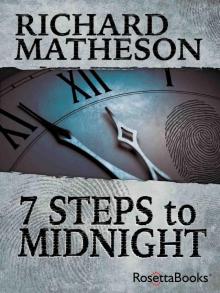 7 Steps to Midnight
7 Steps to Midnight Somewhere in Time
Somewhere in Time Ride the Nightmare
Ride the Nightmare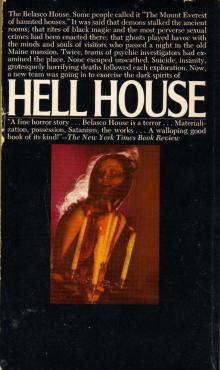 Hell House
Hell House Hunger and Thirst
Hunger and Thirst Lyrics
Lyrics Other Kingdoms
Other Kingdoms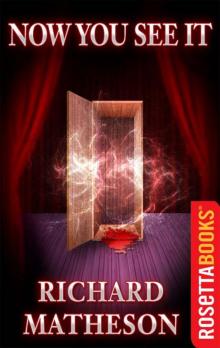 Now You See It . . .
Now You See It . . .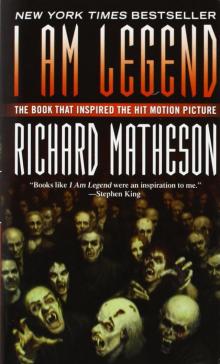 I Am Legend
I Am Legend The Box: Uncanny Stories
The Box: Uncanny Stories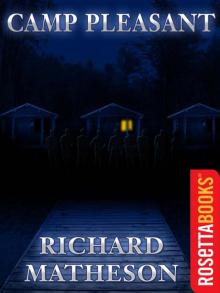 Camp Pleasant
Camp Pleasant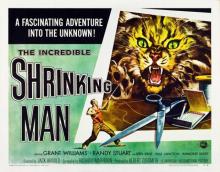 The Incredible Shrinking Man
The Incredible Shrinking Man What Dreams May Come
What Dreams May Come The Gun Fight
The Gun Fight Someone Is Bleeding
Someone Is Bleeding Mediums Rare
Mediums Rare A Stir of Echoes
A Stir of Echoes Backteria and Other Improbable Tales
Backteria and Other Improbable Tales Offbeat: Uncollected Stories
Offbeat: Uncollected Stories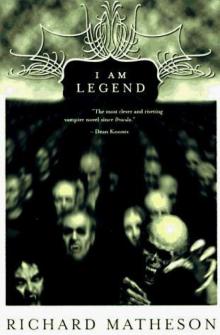 I Am Legend and Other Stories
I Am Legend and Other Stories The Best of Richard Matheson
The Best of Richard Matheson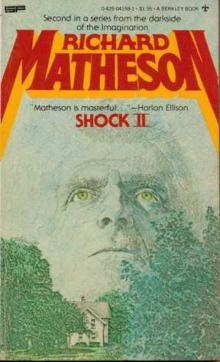 Shock II
Shock II Steel: And Other Stories
Steel: And Other Stories Richard Matheson Suspense Novels
Richard Matheson Suspense Novels The Link
The Link Nightmare At 20,000 Feet
Nightmare At 20,000 Feet Shadow on the Sun
Shadow on the Sun![Steel and other stories [SSC] Read online](http://i1.bookreadfree.com/i/03/21/steel_and_other_stories_ssc_preview.jpg) Steel and other stories [SSC]
Steel and other stories [SSC] Created By
Created By Offbeat
Offbeat Duel
Duel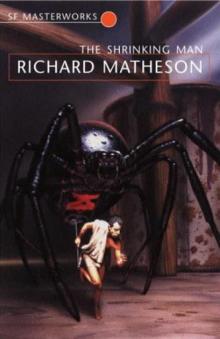 The Shrinking Man
The Shrinking Man Steel
Steel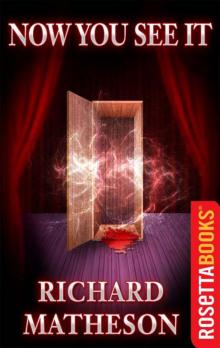 Now You See It
Now You See It